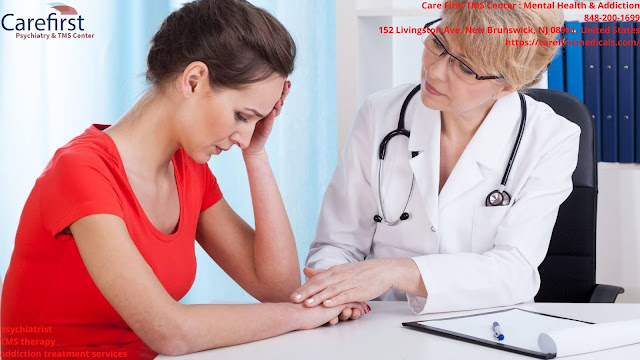Care First TMS Center : Mental Health & Addiction
Care first is a leading provider of behavioral health services to skilled nursing and assisted living facilities in the Northeast and Mid-Atlantic states. We provide comprehensive assessments and treatments through a multidisciplinary team of Psychiatrists, Psychologists, Nurse Practitioners, and Licensed Clinical Social Workers.
Care First partners with many skilled nursing and assisted living facilities throughout the Northeast states, providing high quality and consistent behavioral health services, to improve the mental health of your residents. Our clinicians work closely with your existing facility services including nurses, social services departments, and Primary Care Physicians, to optimize elderly mental health services and provide proactive behavioral health care.
TMS THERAPY SERVICES
Major Depressive Disorder (MDD) consists of recurrent depressive episodes characterized by low mood, poor concentration and energy, disturbance of sleep and appetite, loss of interest in previously pleasurable activities, and feelings of guilt or shame. Depression may result in suicide or suicide attempts for many people.
PREGNANCY:
Many women choose to avoid antidepressant medications during pregnancy, but worsening depression symptoms could put patients in great danger. Based on a number of studies, TMS appears to be a promising treatment option for pregnant women who do not wish to take antidepressant medications. Many protocols have used exclusively right sided treatment with slow frequency stimulation to minimize the number of pulses needed to treat an episode. Thus far there have been no untoward effects to the developing baby
BIPOLAR DISORDER
The depression symptoms of Bipolar Disorder are similar to Unipolar Depression (also called Major Depressive Disorder or MDD) and may include an individual being withdrawn from family and friends, showing noticeably little interest in usually pleasurable activities, and perhaps a significant change in weight or sleep. Persons with Bipolar Disorder also tend to have low energy levels during their depressive periods, and may have a hard time concentrating. In its most serious forms, these periods may result in thoughts of death or suicide. Depression symptoms of Bipolar could be managed by TMS treatment after manic symptoms control.
SCHIZOPHRENIA
Schizophrenia is a disorder of the brain that affects approximately 1% of the world’s population. Symptoms usually consist of auditory hallucinations, delusions, disorganized thoughts and behavior, and impairment of usual social and recreational activities. Most people with schizophrenia will develop symptoms for the first time in their 20’s. Men tend to have an earlier onset than women. The severity can range from mild to completely disabling. The mainstay of treatment currently involves use of antipsychotic medications in combination with psychological and social support.
Suicide is a complication of schizophrenia in about 10% of patients, and substance abuse occurs in 50%.
TMS is being successfully used to treat some of the depression symptoms associated with schizophrenia, mainly negative symptoms. Auditory hallucinations have been shown also to be reduced with TMS, and other symptoms such as social withdrawal have been ameliorated as well.
SELECTED REFERENCES
Bagati, D., S.H. Nizamie, et al. (2009). “Effect of augmentatory repetitive transcranial magnetic stimulation on auditory hallucinations in schizophrenia: randomized controlled study.” Aust N Z J Psychiatry 43(4): 386-392.
Feinsod, M., B. Sreinin, et al. (1998). “Preliminary evidence for a beneficial effect of low-frequency, repetitive transcranial magnetic stimulation in patients with major depression and schizophrenia.” Depression and Anxiety 7: 65-68.
Freitas, C., F. Fregni, et al. (2009). “Meta-analysis of the effects of repetitive transcranial magnetic stimulation (rTMS) on negative and positive symptoms in schizophrenia.” Schizophr Res 108(1-3): 11-24.
Geller, S. G., N. Grisaru, et al. (1997). “Slow magnetic stimulation of prefrontal cortex in depression and schizophrenia.” Progress in Neuro-Psychopharmacology & Biological Psychiatry 21: 105-110.
Goyal, N., S. H. Nizamie, et al. (2007). “Efficacy of Adjuvant High Frequency Repetitive Transcranial Magnetic Stimulation on Negative and Positive Symptoms of Schizophrenia: Preliminary Results of a Double-Blind Sham-Controlled Study.” J Neuropsychiatry 19(4): 464-67.
Hoffman, R. E., N. N. Boutros, et al. (2000). “Transcranial magnetic stimulation and auditory hallucinations in schizophrenia.” Lancet 355(9209): 1073-1075.
Lee, S. H., W. Kim, et al. (2004). “A double blind study showing that two weeks of daily repetitive TMS over the left or right temporoparietal cortex reduces symptoms in patients with schizophrenia who are having treatment-refractory auditory hallucinations.” Neurosci Lett 376: 177-181.
Saba, G., C.M. Verdon, et al. (2006). “Transcranial magnetic stimulation in the treatment of schizophrenic symptoms: a double blind sham controlled study.” Psychiatr Res 40(2):147-152.
Care First TMS Center : Mental Health & Addiction
152 Livingston Ave, New Brunswick, NJ 08901, United States
+18482001699

Comments
Post a Comment